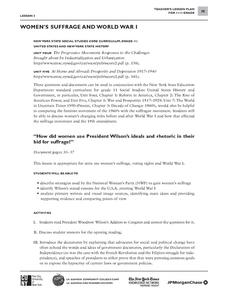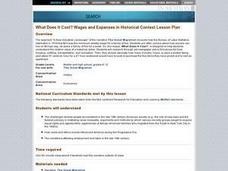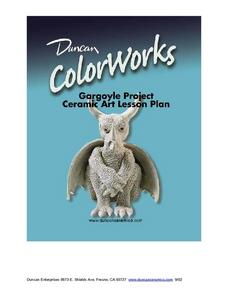Curated OER
Stand Up and Sing: Music and Our Reform History
Students examine events of historical significance in music. In groups, they are given pieces of sheet music and work together to try to determine the social and political conditions of the time based on the lyrics. They write their own...
Curated OER
Regulating Drugs: The Creation of the FDA
Students view a video about the Food and Drug Administration. They research its history and functions. They examine problems facing society today. They compare and contrast these issues with those faced during the Progressive Era.
Curated OER
Worth a Thousand Words: Depression-Era Photographs
Students view images of New Deal programs to see its successes. They work in groups to create captions for the images and suggest captions that might indicate different meanings.
Alabama Department of Archives and History
Cells for Sale - Convict Leasing in Alabama
The benefits and drawbacks of convict leasing following the Civil War are the focus of a lesson that asks groups to examine primary source materials to gain an understanding of the program before individuals decide whether they are in...
Alabama Department of Archives and History
Nellie Bly to Dr. Peter Bryce: 19th Century Asylum Reform
What kind of treatment could a patient expect in an asylum during the 1800's? The abusive and neglectful conditions in 19th century asylums are the focus of a lesson that examines the work of reformers Nellie Bly, Dorothea Dix, and Dr....
National Endowment for the Humanities
Upton Sinclair, Theodore Roosevelt, and Harvey W. Wiley
Though Upton Sinclair's novel The Jungle shocked the American public into a thorough examination of the meat-packing industry, the author was disappointed that his book's main argument—the exploitation of American immigrants—was not part...
City University of New York
Woman's Suffrage and World War I
How did women use President Wilson's ideals and rhetoric in their bid for suffrage? To answer this essential question, class groups analyze primary written documents and visual images.
City University of New York
Urban Politics: Machines and Reformers
What were political machines and whom did they serve? As part of a study of US immigration patterns and how these patterns influenced politics, groups investigate how Tammany Hall and other political machines gained support from voters.
Curated OER
The Muckrakers Interdisciplinary Unit
Eighth graders complete an Interdisciplinary Unit on the Muckrakers and the Progressive Movement. Students describe life in America and how Progressive Reformers changed it. identify specific problems and propose solutions. Students...
Carolina K-12
Plessy v. Ferguson & the Roots of Segregation
How far in the past do the roots of Jim Crow and segregation extend? Young historians closely consider this question using detailed PowerPoint slides as a basis for discussion rather than lecture, culminating in an activity where class...
Curated OER
The Works Progress Administration and the New Deal
Students research the Depression Era and how it contributed to the formation of the Works Progress Administration. After research, they create a skit to illustrate life during the Depression and the role of the Works Progress...
Curated OER
The Sixties Protests and Social Change
Students identify, examine and analyze photographs of the sixties to determine the forces of social change at work in America during this decade. They determine the goals of each movement and the methods used by each to achieve those goals.
US House of Representatives
Women Pioneers on Capital Hill, 1917–1934
New ReviewAs part of a study of the women elected to Congress from 1917 to 1934, groups research and then design a museum exhibit that describes the life and the congressional service of one of these women.
Jane Addams Project
Woman Suffrage
Suffragettes, suffragists, and anti-suffragists. A two-day, richly detailed lesson plan has young historians investigate the twentieth-century suffrage movement. Groups examine primary and secondary source materials about Jane Addams and...
National Woman's History Museum
Congresswoman Jeannette Rankin
Political activist, suffragette, pacifist, and the first woman elected to Congress, Jeannette Rankin has been largely ignored in history and history textbooks. Young historians set out to rectify that situation by examining primary...
Curated OER
Child Labor in Maryland: An Historical Investigation
Tenth graders, after reading two excerpts about contemporary child labor situations, discuss two broad questions in detail along with the industrial boom following the Civil War conditions in the United States. They investigate how the...
Curated OER
What Does It Cost?
Students study the challenges diverse people encountered in the late 19th century American society, how racial and ethnic events influenced America during the Progressive Era, and the conditions affecting employment and labor in the late...
Curated OER
Children in the Labor Force
Young scholars, after reading the articles "Historical Background" and "Progressive Era: Child Labor," create a two to three page document using Inspiration that deals with either the reasons children worked, child labor laws and Lewis...
Curated OER
Activism and Social Reform in America from 1800-1850
Students discuss idea of social status, examine antebellum social reform movements, and compare and contrast experiences of activists who sought to improve workers' lives, end slavery, reform immigration laws, and establish voting rights...
Curated OER
Pre-Reading Preparation
Students research the English Renaissance era. In this research instructional activity, students complete this activity before reading the story The Prince and the Pauper to learn about the history. They pick topics and work in groups to...
Curated OER
Gargoyles: Ceramics
Study the symbolism and significance of Gargoyles throughout the Gothic era, and then make one. Kids visit three different websites to learn about these goolish protectors, then hone their sculpting skills while making one. They make...
Curated OER
African-American Soldiers in World War I: The 92nd and 93rd Divisions
Students research the role played and contributions made by African American soldiers during World War I. They discuss the evolution of civil rights in America's history, and the progress that has been made in the last 100 years.
Curated OER
African-American Soldiers After World War I: Had Race Relations Changed?
Students utilize an online database to conduct research and analyze the conditions for African-Americans before and after World War I. They consider the role of the 92nd and 93rd divisions in affecting social change.
Center for Civic Education
Citizenship Schools and Civic Education During the Civil Rights Movement and in the Present
Your young historians will discover the importance that citizenship education has played in the social progress of the United States as they learn about early efforts to discourage African Americans from voting in the 1960s.
Other popular searches
- U.s. History Progressive Era
- Us History Progressive Era
- The Progressive Era
- Unit Plan Progressive Era
- Progressive Era Amendments
- American Progressive Era
- History Progressive Era
- Progressive Era Economics
- Progressive Era Roosevelt
- Progressive Era Suffrage
- Progressive Era Reformers
- Progressive Era Muckraker

























